Top 15 RingEX Alternatives & Competitors in 2024
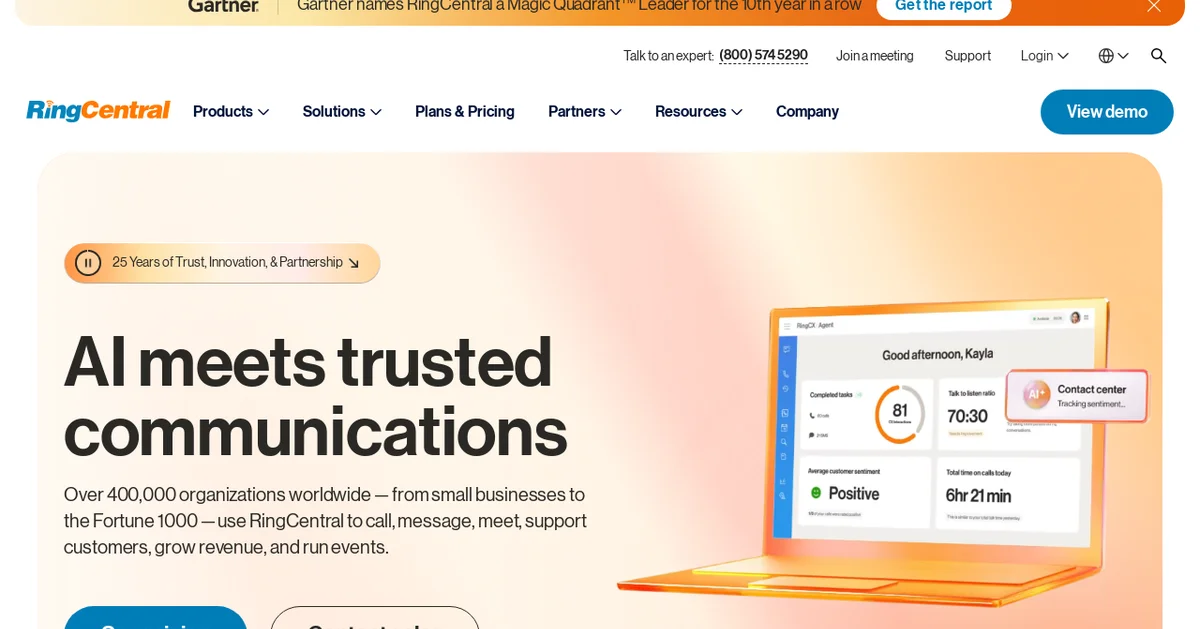
RingCentral has established itself in the cloud communications space as a trusted solution for businesses seeking to simplify their communication channels. It provides a reliable platform that integrates various services, catering to a wide range of industries. The company offers business phone services, contact center solutions, online fax, and video meeting capabilities. Businesses of all sizes depend on RingCentral’s platform to keep their teams connected and improve customer interactions.
Recognized by analysts, RingCentral stands out for its innovation and scalability. It appeals to both startups and established corporations aiming to modernize their operations. With features like AI tools and an open platform for integrations, it helps businesses boost productivity and improve customer experiences. This blend of reliability and advanced technology explains why RingCentral leads the market, trusted by over 400,000 organizations globally.
While RingEX is a great product, it’s always good to shop around and look for alternatives. This article identifies some top competitors and their pros and cons.
Twilio
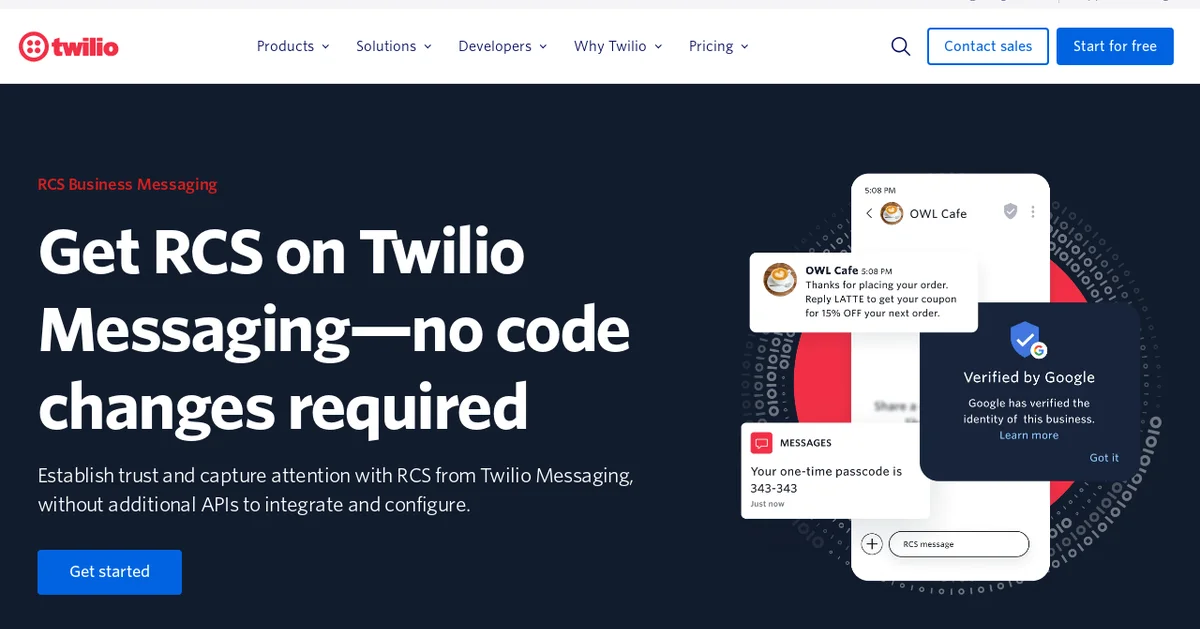
Twilio stands out as a strong alternative in the cloud communications space, providing businesses with a solid toolkit for customer engagement. Founded to help developers create seamless communication experiences, Twilio connects companies with their customers through various channels, including voice, SMS, and email. With over 300,000 brands onboard, Twilio has built a reputation for reliable performance, showed by handling more than 50 billion voice minutes and 167 billion messages in one year.
One key feature that differentiates Twilio is its developer-centric approach. The platform offers official SDKs for languages like Node.js, Python, and Ruby, enabling developers to get started without extensive setup. The ability to deploy applications quickly with Twilio Functions allows businesses to bring ideas to life without managing infrastructure. This level of flexibility attracts many startups and enterprises.
Twilio’s unique positioning shows its focus on personalization and contextual engagement. It helps companies like Domino’s and Allergan Aesthetics reduce customer acquisition costs while driving sales through targeted messaging strategies. The platform’s ability to analyze customer data in real-time allows businesses to send customized messages via the preferred channel of their users, improving engagement and loyalty.
Twilio combines an easy setup with powerful features, making it a solid alternative to RingCentral for businesses seeking flexible communication solutions. Its focus on developer support and personalized customer experiences boosts its appeal.
Pros
- Developer-friendly SDKs for quick implementation
- High reliability with over 99.95% API uptime
- Advanced personalization through real-time data access
- Versatile communications across multiple channels
Cons
- May require technical expertise for optimal use
- Less emphasis on built-in customer service features compared to RingCentral
- Pricing can increase with higher usage volumes
Zoom
Zoom is a known player in the cloud communications space. Founded in 2011, Zoom gained traction as a video conferencing tool, especially as remote work grew. Its simple interface made it a popular choice for businesses, educators, and families.
A key feature is its virtual background capability, allowing users to appear in different environments, useful for professionals wanting to maintain a polished look during calls. The platform also supports large meetings with up to 1,000 video participants, suitable for businesses scaling their communications. Zoom’s breakout rooms let users split into smaller groups for discussions, adding flexibility for educational institutions and workshops.
Zoom’s marketplace offers various integrations with popular tools, helping businesses streamline their processes. The platform has strong security features, like end-to-end encryption, important for companies concerned about data privacy.
Their story includes rapid growth, capturing a significant market share. This growth isn’t just about user numbers; Zoom has built a reputation for reliability and ease of use, traits that appeal to businesses seeking efficiency.
Zoom is a strong alternative to RingCentral with features like virtual backgrounds, breakout rooms, and a solid integration marketplace. Its focus on user experience and security enhances its appeal for organizations adapting to remote work.
Pros
- Simple interface
- Large participant capacity
- Virtual backgrounds and breakout rooms
- Strong security features
- Wide third-party integrations
Cons
- Can become costly for large teams
- Risk of “Zoom fatigue” among users
- Recent scrutiny over privacy issues
Vonage
Vonage is a player in the cloud communications market, offering solutions that improve business communication. Founded in 2001, Vonage began as a VoIP provider and has developed into a platform that includes voice, video, messaging, and customer engagement tools. This flexibility makes it a viable alternative to RingCentral.
One standout feature is its strong API capabilities. Businesses can integrate communication functions into their workflows or applications, creating custom solutions to meet specific needs. Vonage also emphasizes scalability, allowing businesses to grow without needing to switch platforms or face high costs when adding users.
The variety of communication tools offered is another key point. Whether you need a calling solution, video conferencing, or team messaging, Vonage covers all needs. Its focus on unified communications can improve collaboration within teams, regardless of location.
Vonage provides various pricing plans that suit businesses of all sizes. This accessibility can help startups find affordable options without sacrificing quality. With strong customer support, Vonage aims to ensure users better their services.
Vonage stands out for its versatile communication offerings, custom integrations, strong APIs, and scalable solutions.
Pros
- Comprehensive communication tools
- Strong API capabilities for custom solutions
- Scalable options for growing businesses
- Competitive pricing plans
Cons
- May require a learning curve for new users
- Potentially less focus on non-communication features compared to some competitors
Microsoft Teams
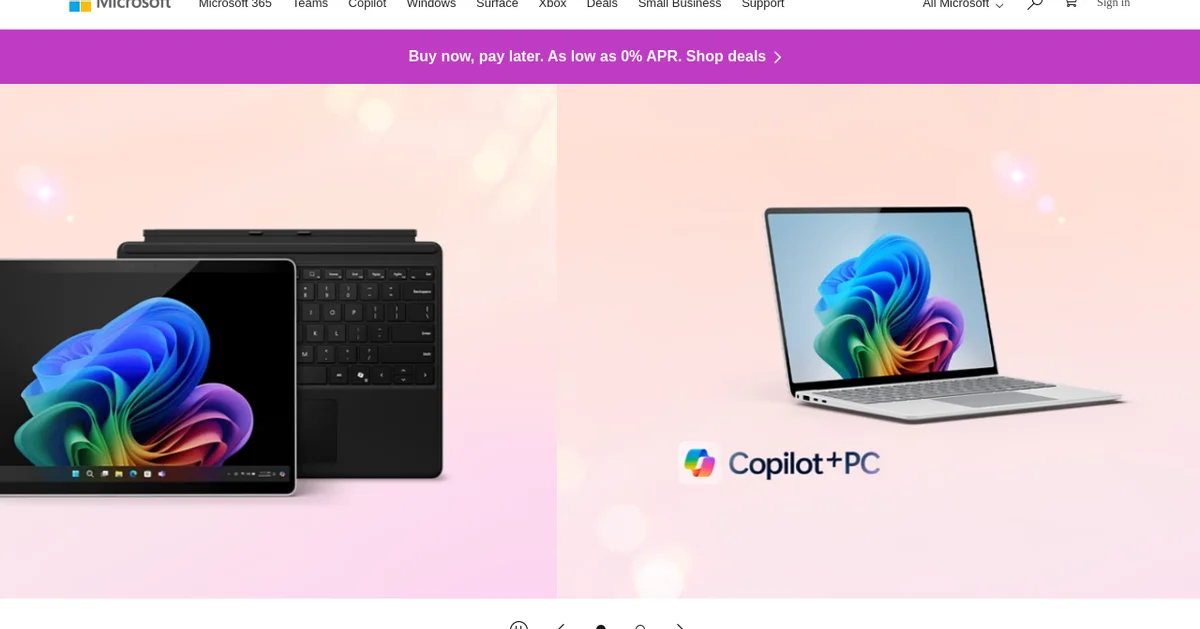
Microsoft Teams is a collaboration platform that combines chat, video meetings, file storage, and application integration. Its foundation in Microsoft’s Office 365 suite has made it a popular tool for businesses of all sizes. Teams stands out for its easy integration with other Microsoft services, allowing collaboration on documents in real-time without leaving the platform.
A focus on security and compliance features appeals to businesses concerned about data protection. With built-in encryption and safety measures, Teams provides reassurance for companies handling sensitive information. Additionally, the ability to customize the interface and workflows helps teams work in a way that fits their needs.
The story behind Teams is interesting. It emerged when remote work became more common, addressing the demand for effective digital communication tools. Microsoft recognized the challenges teams faced while collaborating from different locations and created a platform to tackle those issues.
Teams offers a user-friendly experience, crucial for adoption. The chat feature enables quick conversations, while threaded discussions keep interactions organized. Video meetings provide clear sound and visuals, helping remote gatherings feel more connected.
Microsoft Teams serves as a complete solution that can adapt to various business needs. It attracts organizations seeking a solid, integrated platform without juggling multiple applications.
Pros
- Integrated with Microsoft Office suite
- Strong security features
- Customizable interface
- High-quality video and audio
Cons
- May be overwhelming for new users
- Requires Office 365 subscription for full features
- Limited integrations outside of Microsoft ecosystem
Dialpad
Dialpad is a cloud communications platform known for its AI features that improve collaboration and productivity for businesses of all sizes. It integrates voice, video, and messaging into one app, helping teams communicate efficiently while reducing distractions. This makes it appealing to small and medium businesses looking to scale without added complexity.
A key strength of Dialpad is its AI capabilities. The platform includes AI Recaps that summarize meetings and provide actionable insights, allowing users to stay organized without manual note-taking. This saves time and ensures critical details are not missed. Additionally, the AI Contact Center makes onboarding new agents faster and easier, which benefits businesses with high turnover in customer support roles.
Dialpad positions itself as user-friendly and adaptable, offering strong integrations with other tools. Companies can connect Dialpad to their existing systems with over 70 integrations, making the transition easier for teams already using various software.
Comparing Dialpad to alt_15, its focus on automation and data-driven decisions distinguishes it. The AI Coaching Hub offers insights and metrics that help team leaders make informed decisions about performance, essential for succeeding in competitive markets.
Dialpad seeks to simplify workflows while providing teams with the tools they need to impress customers and grow their business.
Pros
- AI features boost productivity
- Instant call summaries reduce manual work
- Fast onboarding with AI Playbooks
- Wide integration options
Cons
- AI features may not suit every business model
- Smaller teams might find some tools overwhelming
8x8
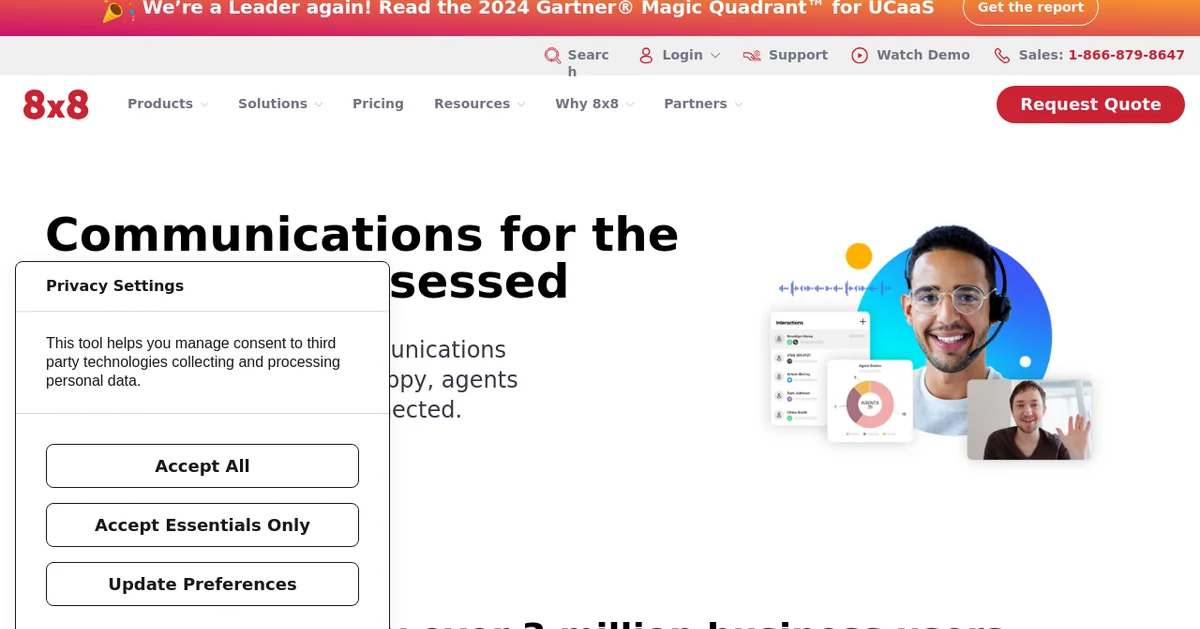
8x8 is a key player in cloud communications, particularly for businesses aiming to improve customer service and team collaboration. Trusted by over 3 million users, 8x8 provides an integrated platform that combines voice, video, chat, and contact center solutions into one system. This platform allows businesses to streamline communications without juggling multiple tools, ensuring a smooth experience for both customers and employees.
One standout feature of 8x8 is its customer engagement capabilities. With strong contact center functions, agents can deliver excellent service, making it easy to adjust call flows and prompts. Their analytics help companies understand customer journeys for informed decision-making in real-time.
8x8’s global reach further distinguishes it, with a network spanning over 55 countries, ensuring reliable connections no matter where clients or teams are located. They maintain an impressive 99.999% uptime SLA. Security and compliance are also integral, as they follow strict standards and provide end-to-end encryption to protect sensitive data. Additionally, their 24/7 multilingual support enhances the user experience.
Considering alternatives to RingCentral, 8x8 stands out with its comprehensive platform, strong focus on customer engagement, global capabilities, and commitment to security.
Pros
- All-in-one platform uniting various communication tools
- Excellent contact center and customer engagement features
- Global coverage with a strong uptime guarantee
- Solid analytics for better decision-making
- Strong security measures and compliance standards
Cons
- May require a learning curve for new users
- Pricing may vary based on specific features and services
- Limited offline functionality in some areas
Cisco Webex
Cisco Webex is a key player in cloud communications, especially for businesses needing collaboration tools. The platform offers a set that includes calling, meetings, messaging, webinars, and more. Its strength comes from AI features that improve productivity and personalize user experiences. For instance, Webex saves participants time with personalized summaries and troubleshooting tools that efficiently resolve issues.
Designed to unify communication and collaboration, Cisco Webex has changed into a versatile solution for a diverse workforce. Whether hosting a large webinar or a small team meeting, Webex creates an engaging experience suited to various communication styles and languages. This adaptability makes it stand out among cloud communication options.
A key aspect of Webex is its focus on security and privacy. Built-in compliance options meet different industry standards, making it a secure choice for many organizations. The platform’s advanced security features improve protection for sensitive information, appealing to businesses in regulated sectors.
Webex also uses AI to improve interactions. It can automate customer journeys and provide analytics to boost team productivity. The integration of ThousandEyes improves troubleshooting and maintains smooth communication across devices and locations.
Pros
- Suite for various communication needs
- AI-driven features for personalized experiences
- Strong security and compliance options
- Flexibility for different meeting sizes and formats
- Integration capabilities with existing workflows
Cons
- May have a steeper learning curve for new users
- Some advanced features might need additional training
- Pricing structure can be complex for smaller businesses
- Potential reliance on internet connectivity for optimal performance
GoToConnect
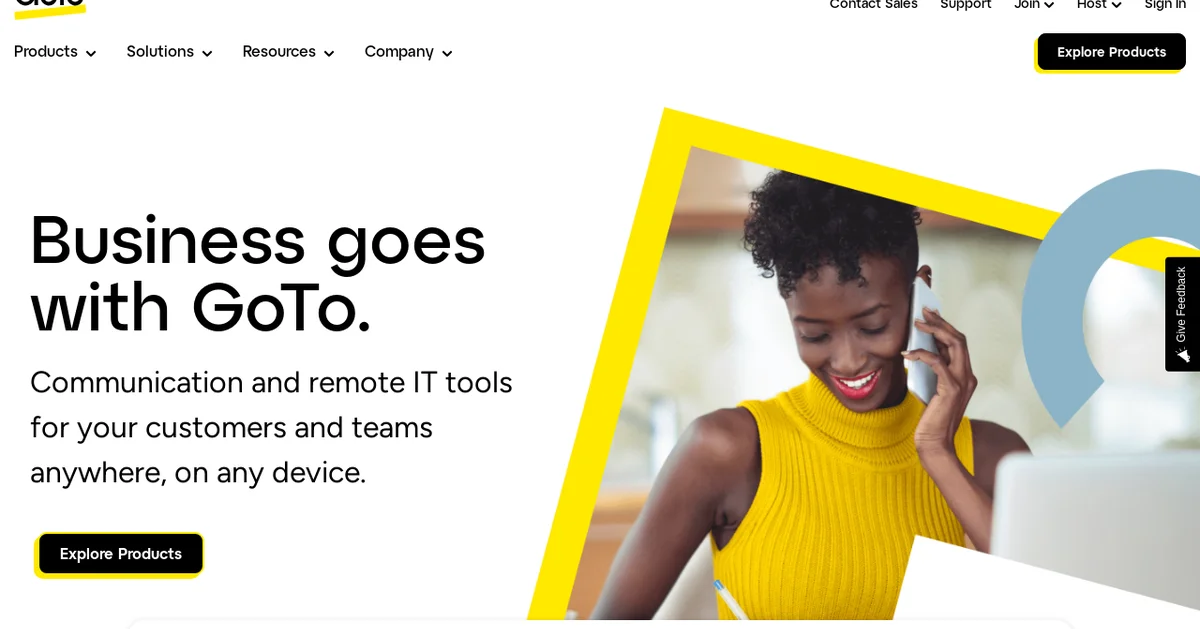
GoToConnect is making strides in the Cloud Communications space with its solid mix of voice, video, and messaging capabilities. It’s part of the GoTo family, a brand recognized for products like GoToMeeting and LastPass. GoToConnect aims to create a seamless experience for businesses seeking reliable communication tools without added complexity.
One key feature is their all-in-one solution. Unlike some competitors, GoToConnect combines voice, video conferencing, SMS, and team messaging into one platform. This integration streamlines workflows, allowing users to spend less time managing multiple applications and more time focusing on what matters—connecting with customers and colleagues. They also offer easy-to-use features, like call recording and a smart call routing system, which improve productivity and customer interactions.
GoToConnect focuses on flexibility and ease of use. Businesses of all sizes benefit from its straightforward setup and clear interface. Whether it’s a small startup or a larger enterprise, users appreciate that they can customize the service to their needs without overwhelming options. This adaptability sets them apart from some other players in the market, who may provide more complicated systems.
GoToConnect offers a strong alternative to RingCentral for those seeking a unified communications platform. Its blend of user-friendly features, flexibility, and integration gives it an edge in many ways.
Pros
- All-in-one platform for voice, video, and messaging
- Easy setup and clear interface
- Smart call routing and recording features
- Flexible options for businesses of all sizes
Cons
- May lack some advanced features found in larger competitors
- Pricing can vary based on selected features
- Fewer integrations with third-party apps compared to others
Aircall
Aircall is a cloud communication platform aimed at improving customer interactions. Founded to streamline phone operations for teams, Aircall emphasizes flexibility and integration. Trusted by over 19,000 companies, it has become a reliable choice for sales and support.
A standout feature is seamless integration with over 100 applications like Salesforce, HubSpot, and Zendesk. Businesses can connect their essential tools in one place, simplifying customer relationship management. The interface allows users to set up operations quickly, benefiting teams that want to get started without lengthy onboarding.
A key aspect of Aircall’s value is its emphasis on better conversations. The platform includes functions such as call recordings and IVR (Interactive Voice Response), which improve discussion clarity and boost customer satisfaction. One customer noted a 4% increase in CSAT after switching to Aircall, showing how meaningful phone interactions can improve the overall experience.
Aircall also focuses on data-driven insights, offering analytics that help businesses evaluate their communication strategies. Features like smart call routing based on agent skills enable teams to improve efficiency and personalize the customer experience, distinguishing them from competitors like RingCentral.
Pros
- User-friendly interface for quick setup
- Extensive integrations with leading applications
- Features like call recordings improve training and quality
- Focus on customer experience with smart routing and IVR
Cons
- May not cater to every specific industry need
- Can require a learning curve for advanced features
Nextiva
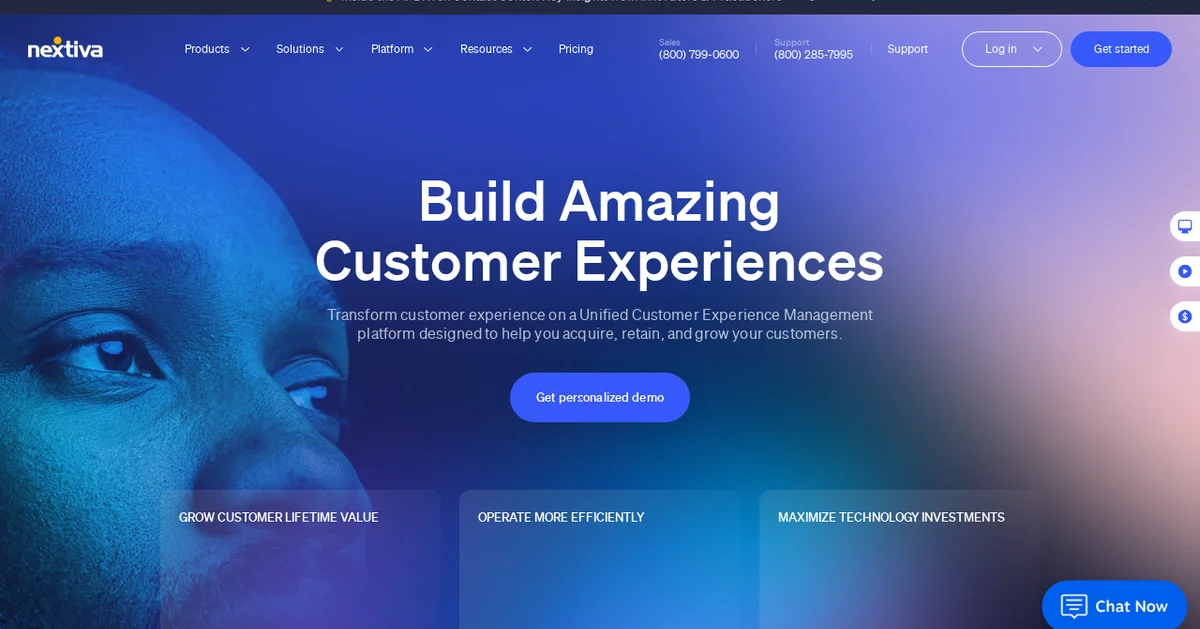
Nextiva stands out as a strong option in cloud communications due to its focus on creating smooth customer experiences. Founded on the belief that excellent customer service drives business success, Nextiva has developed an AI-driven Unified Customer Experience Management platform. This platform connects various communication channels—voice, chat, SMS, email, and social media—allowing businesses to engage customers wherever they are.
One of Nextiva’s key features is its patented customer journey orchestration, which offers real-time insights. Companies can automate workflows, making it easier for teams to respond quickly to customer needs. This level of integration helps reduce IT overhead while increasing collaboration across departments.
Nextiva also excels with its built-in AI capabilities. From pre-built automation to advanced analytics, businesses can quickly implement these tools to improve their operations. This can lower costs and improve workforce management, easing the load on customer-facing staff.
Nextiva enjoys a strong reputation, with recognition as #1 Most Loved on TrustRadius and many 5-star reviews on Trustpilot, showing that many companies trust their platform to boost customer satisfaction.
Key points to consider include:
Pros
- Combines multiple communication channels in one platform
- Real-time insights for better decision-making
- Built-in AI and automation streamline operations
- High customer satisfaction ratings and trust
Cons
- Might require adjustment for teams used to traditional systems
- Some features may take time to fully implement and optimize
Grasshopper
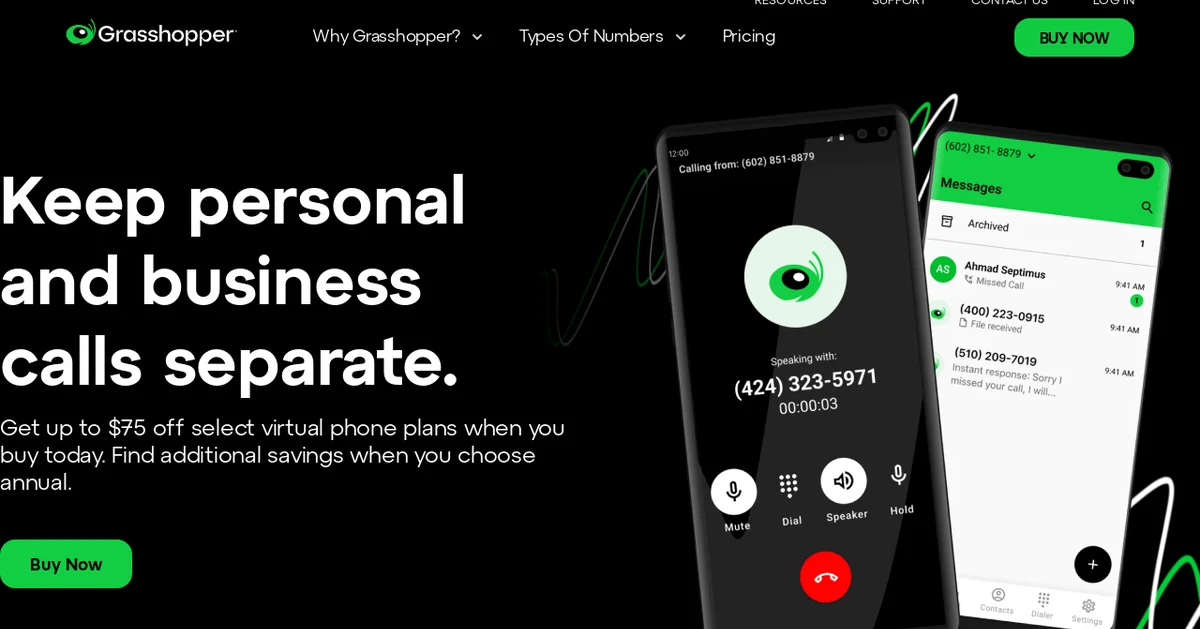
Grasshopper is a virtual phone system that emphasizes simplicity and cost-effectiveness, focusing on small businesses and entrepreneurs. Since its start, Grasshopper has aimed to help users maintain a professional image while keeping personal and business communications separate. A key feature is the ability to choose from different phone number types—local, toll-free, or custom vanity numbers—allowing businesses to select the best number to represent their brand.
With plans starting at $14 a month, Grasshopper offers an affordable solution that maintains functionality. The platform is fully accessible via smartphone or computer, eliminating the need for extra hardware. This accessibility is convenient for users on the go. The Grasshopper app allows users to call and text clients from anywhere.
Notable features include voicemail transcription, which lets you read messages instead of listening, and business texting for quick updates. Users can also benefit from call forwarding, ensuring important calls are never missed, and simultaneous call handling, allowing multiple clients to be served at once. Additionally, having live receptionists through Ruby Receptionist provides an extra layer of professionalism when needed.
Grasshopper serves as a user-friendly, affordable alternative to more complex solutions. It suits small business owners needing a reliable communication tool without added complexity.
Pros
- Affordable monthly plans
- No additional hardware required
- Customizable phone numbers
- Voicemail transcription feature
- Seamless app integration for connectivity
Cons
- Limited advanced features compared to larger platforms
- May not suit larger organizations needing extensive call handling
- Minimal options for scalable solutions
Intermedia
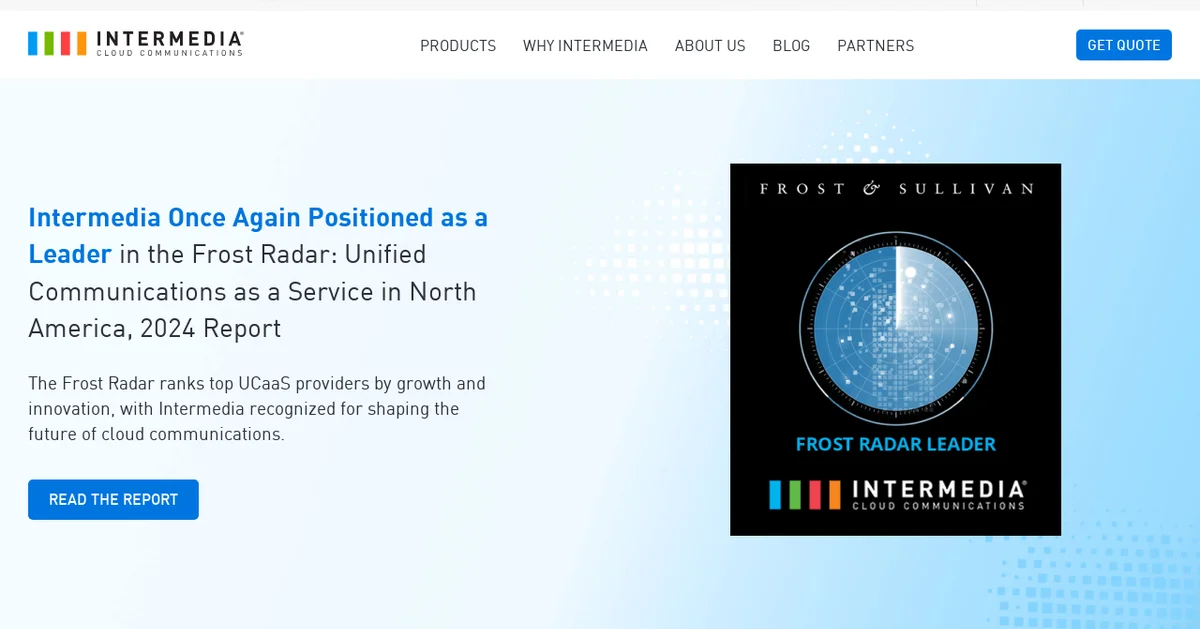
Intermedia is a player in Cloud Communications, offering services designed to streamline business communications. Founded in 1995, the company carved out a niche by focusing on integration and providing a unified platform. This allows businesses to manage everything—from phone systems and video conferencing to email and collaboration tools—all in one place.
Intermedia stands out for its ease of use and strong customer support. They target small to medium-sized businesses seeking a simple way to communicate without juggling multiple providers. Their platform, Intermedia Unite, combines voice, video, chat, and file sharing into a single, user-friendly interface, simplifying collaboration.
Intermedia excels in security features, understanding the need for businesses to protect their data. They provide end-to-end encryption and regular backups, which is essential for companies concerned about data breaches. Their 99.999% uptime guarantee offers users reassurance about reliability.
While RingCentral is a popular option, Intermedia emphasizes customer support with a 24/7 helpdesk and tailored onboarding services. This ensures businesses receive assistance and can start quickly.
Intermedia provides a comprehensive solution focused on the needs of small to medium-sized businesses, strong support, and integrated features that compete well in the Cloud Communications space.
Pros
- All-in-one platform for various communication needs
- Emphasis on customer support and onboarding
- High uptime guarantee for reliability
- Solid security features
Cons
- Less recognized than larger competitors
- Smaller range of integrations compared to some alternatives
Avaya

Avaya is a notable player in cloud communications, focusing on customer experience (CX) and employee engagement. Their Avaya Experience Platform merges various communication channels—voice, video, and messaging—into a smooth experience. This integration helps businesses streamline interactions and optimize workflows, leading to better customer satisfaction and loyalty.
A significant advantage of Avaya is its AI-driven approach. They use artificial intelligence to boost service efficiency and personalize customer journeys. This allows companies to provide consistent interactions across all touchpoints, reflecting a clear understanding of business needs. For example, their solutions enable smarter workload forecasting, improving employee productivity and reducing friction between customer service agents and their tasks.
Avaya’s commitment to flexibility is important. They allow businesses to decide how and when to innovate, ensuring companies can grow without major disruptions. Through their Communication & Collaboration Suite or specific CX solutions, Avaya supports a transformation that aligns with a company’s needs.
Their experience with large enterprises demonstrates their capability. Organizations like DIRECTV and Goodwill Michiana rely on Avaya to improve operations and achieve impressive results without overhauling existing systems.
Pros
- AI-driven innovations to improve customer and employee experiences
- Integration of multiple communication channels for smooth interactions
- Flexibility in scaling and implementing solutions with minimal disruption
- Proven success with large enterprises
Cons
- Potential challenges in implementation for businesses with legacy systems
- May require some training for end-users unfamiliar with the new tools
- Pricing could be a concern for smaller businesses compared to alternatives
Fuze
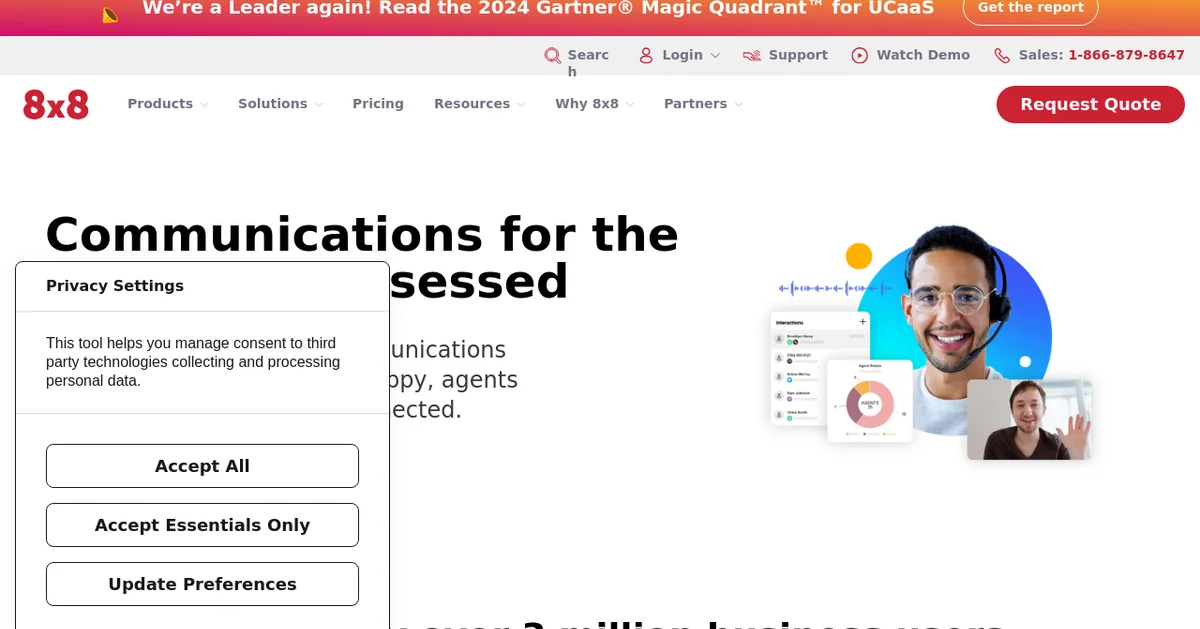
Fuze, a key player in cloud communications, offers solutions that differentiate it from competitors like RingCentral. Their platform unifies communication tools, making collaboration, information sharing, and customer engagement easier for teams. Fuze delivers a complete experience for enterprises, making it a solid choice for organizations aiming to improve internal and customer interactions.
A standout feature of Fuze is its focus on video conferencing. While many platforms offer video as a basic option, Fuze has invested in optimizing this feature, catering to remote and hybrid work models. This enhances the engagement and productivity of team meetings. Fuze also integrates well with various existing tools, allowing businesses to customize their communication experience without overhauling their entire tech setup.
Fuze demonstrates a commitment to customer support, providing users with helpful resources and prompt assistance when needed. Many companies value Fuze’s attention to user experience, often noting the simplicity and training resources available for new users. This support can ease transitions for businesses adopting a new platform.
Fuze offers a strong alternative to RingCentral, especially for those focused on video communication and integrations. Their user-friendly design and solid support can significantly benefit businesses seeking to improve their cloud communication capabilities.
Pros
- Strong video conferencing features
- Easy integrations with existing tools
- Focus on user experience and training resources
- Robust customer support
Cons
- May lack some advanced features found in competitors
- Can be pricier for smaller organizations
Mitel
Mitel is a notable player in the cloud communications market, offering a mix of voice, video, and collaboration solutions for businesses of all sizes. Founded in 1972, Mitel has a history that reflects its experience and reliability. While RingCentral emphasizes an all-in-one interface, Mitel focuses on flexibility, providing a variety of deployment options including on-premises, hybrid, and cloud solutions. This is an important factor for companies looking to customize their communication setup.
A key aspect of Mitel is its focus on integration. It connects seamlessly with various tools and software platforms, allowing businesses to streamline operations without being tied to a single ecosystem. Users can improve productivity and communication with features like call analytics and a mobile app that allows access to services anywhere. Mitel’s strong customer support is another advantage, with dedicated resources available to help clients make the most of their systems.
Mitel also provides different packages tailored for specific industries, from healthcare to education. This specialization enables companies to access features that address their particular needs. Their pricing structure offers flexibility, allowing businesses to select a plan that fits their budget and requirements.
Consider Mitel for flexibility, integration, and dedicated support. The company’s solid reputation and tailored solutions may suit your needs.
Pros
- Flexible deployment options (cloud, hybrid, on-premises)
- Strong integration capabilities with existing tools
- Dedicated customer support
- Industry-specific packages
- Competitive pricing structure
Cons
- May require more setup time compared to fully integrated solutions
- Some features may vary by plan, leading to potential confusion